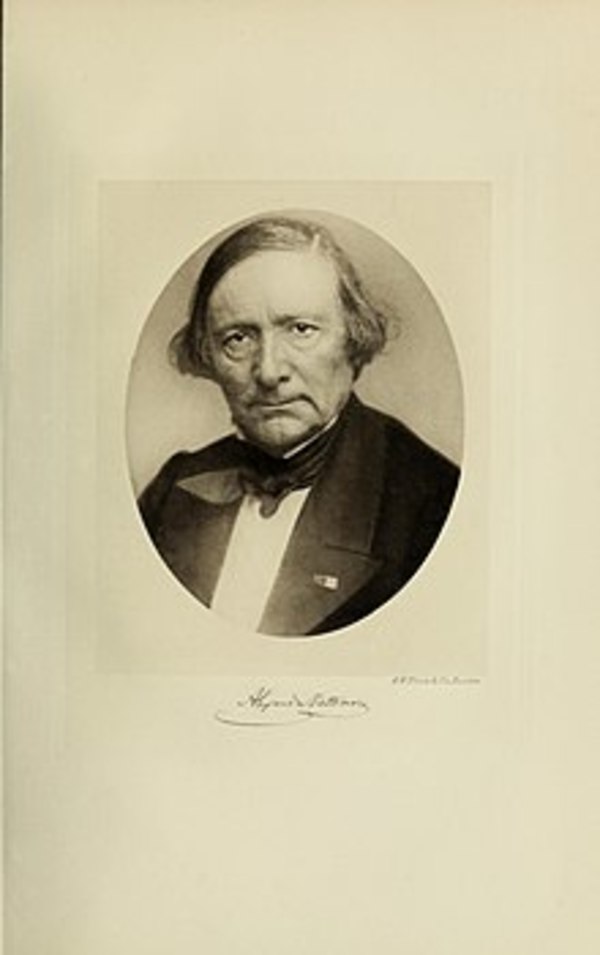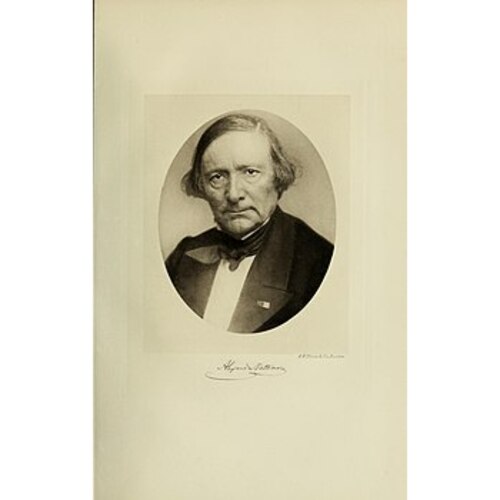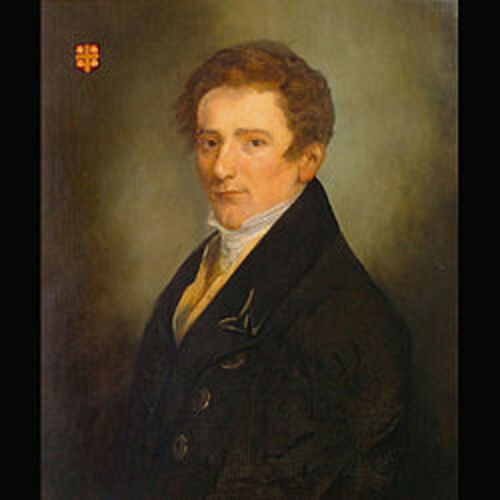
Source: Courtesy of Wikimedia Commons
VATTEMARE, NICOLAS-MARIE-ALEXANDRE, ventriloquist, philanthropist, and promoter of cultural exchanges; b. 7 Nov. 1796 in Paris on the Île Saint-Louis; d. 7 April 1864 in Paris.
Nicolas-Marie-Alexandre Vattemare was the son of a Parisian lawyer who deemed it prudent to retire to his Normandy estate during the Revolution. Alexandre grew up at Lisieux, where his mother sent him to the seminary, as befitted the son of a good family. His gifts as a ventriloquist, which he discovered between the ages of seven and ten, caused the authorities of the seminary to expel him, just as some years later his ability shortened his medical studies in Paris. In 1815 he was invited to accompany a group of wounded Germans to Brandenburg as a nurse, and he amused them so well that some Berlin doctors advised him to make a career in ventriloquism. Immediate success in Berlin was repeated in the great cities of Europe. Fortune having smiled on him, he gave liberally to the charitable organizations of the towns through which he passed. He visited museums and libraries in these towns, and conceived a plan by which many people could share the large numbers of duplicates in books and other objects lying unused in collections. The ventriloquist-philanthropist became the “missionary of exchanges” among the princes and public figures of Europe. Only the French government was hesitant about his system, which he got into action in 1825 on a private basis by means of his Agence Européenne des Échanges. Faced with the reluctance of the French ministries, Vattemare decided to develop his system in America, as La Fayette and General Lewis Cass had suggested. He sailed in September 1839.
The ventriloquist “Mr Alexandre” prepared the way. But as soon as crowds had gathered, it was Vattemare who took over, and his idea was accepted warmly by the Americans. His plan of exchanges first interested Congress and an understanding was reached which allowed him to go to the principal American cities, from New York to New Orleans and Burlington. The states and cities received him cordially and supplied him with money, books, works of art, and natural history specimens for exchange.
In October 1840 he was at Montreal, where, if he had not already been informed, he showed himself to be an astute observer of the political situation. Instead of immediately presenting “Mr Alexandre”, he made contact with civil and religious leaders and journalists, such as Bishop Ignace Bourget*, Governor Sydenham [Thomson*], Denis-Benjamin Viger, “his Canadian host,” and Joseph-Guillaume Barthe* of L’Aurore des Canadas. At the same time he communicated with the public through the newspapers, announcing his plan of exchange and urging the need to bring together people of different beliefs and political opinions. In mid December, having thus announced his intentions, Vattemare launched the idea of an institute that would combine the three principal Montreal societies (the Natural History Society, the Mechanics’ Institute, the Montreal Library) under one roof, also to house the city hall, the stock exchange, and the post office. Enthusiastic, the Board of Trade won the support of the town council, which in turn asked the Special Council, through Lord Sydenham, for permission to borrow £50,000 for a building. These events occurred in January 1841, while “Mr Alexandre” was presenting his ventriloquist’s shows and Vattemare was holding meetings with adult Anglophones and Francophones and with young people.
At the beginning of February, the Vattemare institute seemed settled, and its promoter set off for Quebec. His activity at Montreal had had wide coverage in the newspapers. “Mr Alexandre” and Vattemare again joined forces. The owner and editor of Le Fantasque, Napoléon Aubin*, gave full support to the establishment of a Vattemare institute, grouping the three societies of Quebec (the Literary and Historical Society, the Mechanics’ Institute, the Quebec Library). The old Jesuit college would provide a roof for it. This institute, Aubin insisted, would serve the whole population; a library, a natural history museum, and exhibition halls would meet the needs of popular instruction, and meanwhile chairs would be created for students in law and medicine. The exchange system would play a large part in the development of collections. Vattemare received the entire support of the press, with the Quebec Gazette stressing the opportunity for a rapprochement of races. Funds would come from a loan from the town council and a public subscription. The town council appeared to favour the scheme and appointed some of its members to study the question. A report was submitted on 10 March, but was never acted on. On 5 March Vattemare had already left Quebec for Boston.
The Vattemare institutes at Montreal and Quebec did not materialize, the Special Council disappeared with the union of the Canadas, and the whole scheme was rapidly forgotten with the elections. But three years later, in 1844, the young intellectuals of Montreal set up the Institut Canadien, much on the model of Vattemare’s institute. The Institut Canadien, moreover, was to have numerous branches in the cities of Canada East. As early as 1847, at the time of Vattemare’s second journey to the United States, La Minerve recognized the debt the Institut Canadien owed Vattemare, as did several others, including Pierre-Joseph-Olivier Chauveau* and Adolphe de Puibusque. In 1849 a number of books donated by Vattemare in 1847 to the parliament were destroyed in the burning of its buildings.
The visits of this extraordinary man, whose charm and talents were equalled only by his generosity, were as fruitful a contribution on the cultural level as that of Bishop Forbin-Janson*, made at the same moment, on the religious side. Alexandre Vattemare worked to the last to organize his exchange system through European governments. Three years after his death, on 7 April 1864, it would be accepted with the signing of the Convention des Princes.
ACAM, RLB, 2, p.249. ANQ-M, M-72-141. ANQ-Q, AP-G-76/1, lettre à Adolphe de Puibusque, 15 janv. 1847; lettre d’Adolphe de Puibusque à Faribault, 5 oct. 1847. Archives nationales (Paris), F161, 160, 26 (dossier Puibusque), lettre à Salvandy, 12 mars 1849. AVM, Rapports et dossiers du conseil municipal, 1841, 2, 1re sér. AVQ, Procès-verbaux du conseil, 1840–42, 87–88, 92, 97. Bibliothèque de l’Arsenal (Paris), Rt 5560, 11162 (découpures de journaux du 30 janv. 1828 et du 5 avril 1883). Bibliothèque de l’Institute (Paris), Fonds Vattemare, M 61 F4, 14–15.
Bas-Canada, Conseil spécial, Ordonnances, 1840–41, c.27. Lettres à Pierre Margry de 1844 à 1886 (Papineau, Lafontaine, Faillon, Leprohon et autres), L.-P. Cormier, édit. (Québec, 1968), 134–36. L’Aurore des Canadas, 10 nov. 1840–29 janv. 1841. L’Avenir, 27 nov. 1847. Le Canadien, janv.-mars 1841, 8 sept. 1841, 3 août 1855. Le Fantasque (Québec), janv.-mars 1841. L’Institut ou Journal des étudiants (Québec), janv.-mars 1841. Montreal Herald, Jan. 1841. Morning Chronicle (Quebec), 4 May 1853. Quebec Gazette, January-March 1841.
Ægidius Fauteux, Les bibliothèques canadiennes; étude historique (Montréal, 1916), 34–42. Claude Galarneau, “Le philanthrope Vattemare, le rapprochement des ‘races’ et des classes au Canada: 1840–1855,” Shield of Achilles (Morton), 94–110. Garneau, Hist. du Canada (1882–83), IV, lii-liii. Olivier Maurault, Marges d’histoire (3v., Montréal, 1929–30), III, 58, 71. Jean Ménard, Xavier Marmier et le Canada, avec des documents inédits; relations franco-canadiennes au XIXe siècle (Québec, 1967), 63–64. J.-L. Dargent, “Alexandre Vattemare, 7 novembre 1796–7 avril 1864; fondateur de l’Agence européenne des échanges,” Bull. des bibliothèques de France (Paris), A, IX (1964), 333–39. Olivier Maurault, “Souvenirs canadiens; album de Jacques Viger,” Cahiers des Dix, 9 (1944), 92. Élisabeth Revai, “Le voyage d’Alexandre Vattemare au Canada: 1840–1841; un aperçu des relations culturelles franco-canadiennes: 1840–1857,” RHAF, XXII (1968–69), 257–99. E. M. Richards, “Alexandre Vattemare and his system of international exchanges,” Medical Library Assoc., Bull. (Chicago), XXXII (1944), 413–18.
Cite This Article
Claude Galarneau, “VATTEMARE, NICOLAS-MARIE-ALEXANDRE,” in Dictionary of Canadian Biography, vol. 9, University of Toronto/Université Laval, 2003–, accessed December 31, 2025, https://www.biographi.ca/en/bio/vattemare_nicolas_marie_alexandre_9E.html.
The citation above shows the format for footnotes and endnotes according to the Chicago manual of style (16th edition). Information to be used in other citation formats:
| Permalink: | https://www.biographi.ca/en/bio/vattemare_nicolas_marie_alexandre_9E.html |
| Author of Article: | Claude Galarneau |
| Title of Article: | VATTEMARE, NICOLAS-MARIE-ALEXANDRE |
| Publication Name: | Dictionary of Canadian Biography, vol. 9 |
| Publisher: | University of Toronto/Université Laval |
| Year of publication: | 1976 |
| Year of revision: | 1976 |
| Access Date: | December 31, 2025 |




